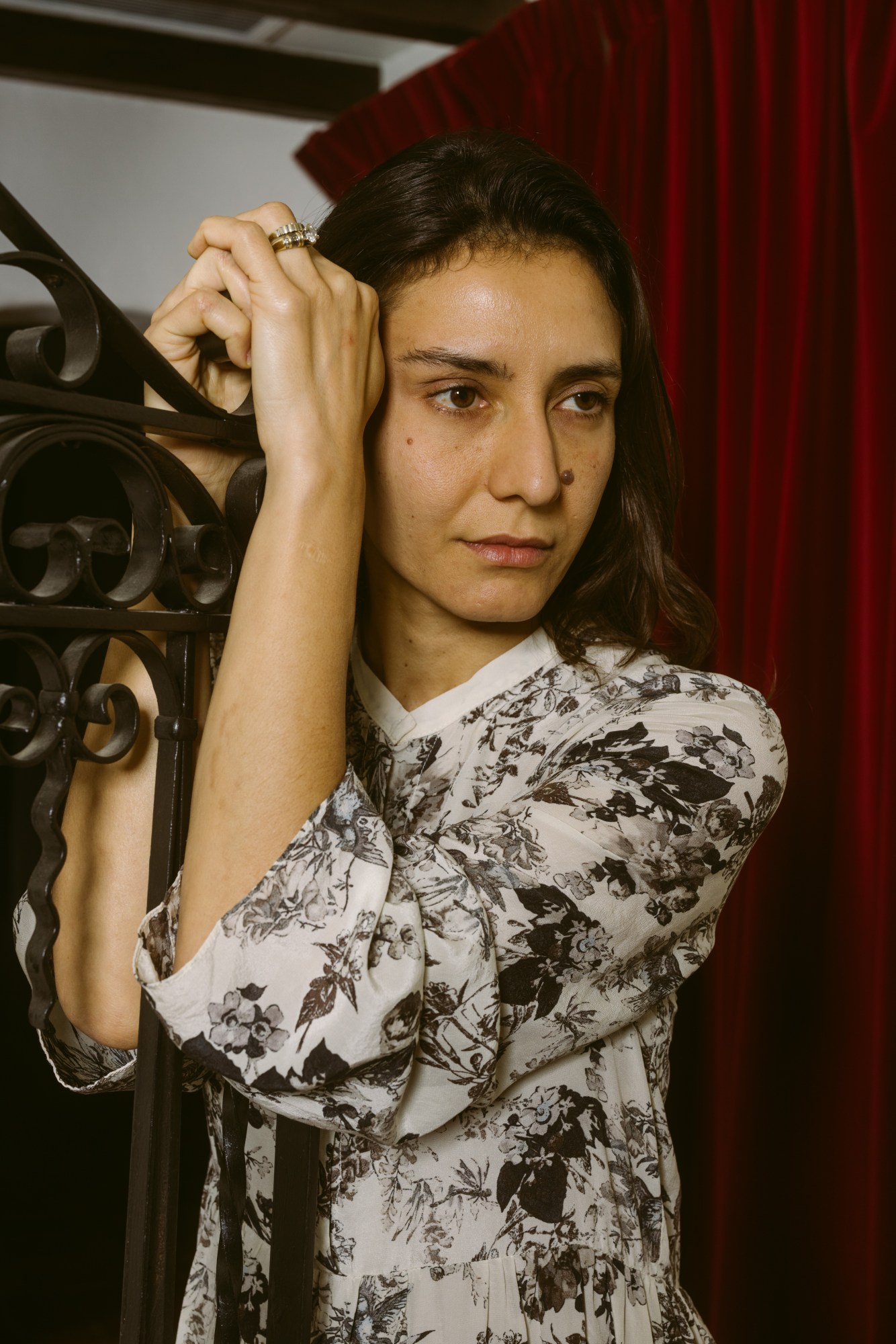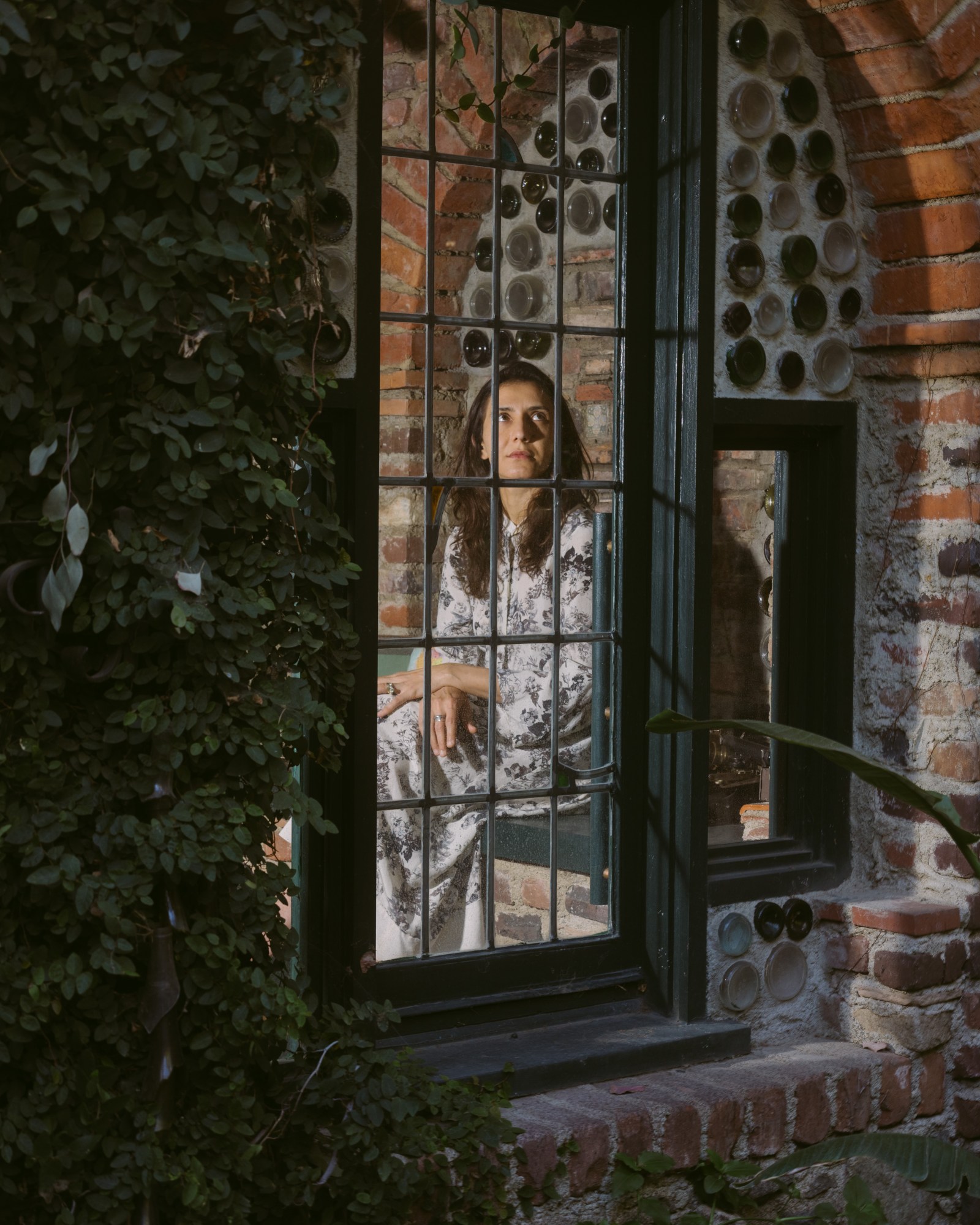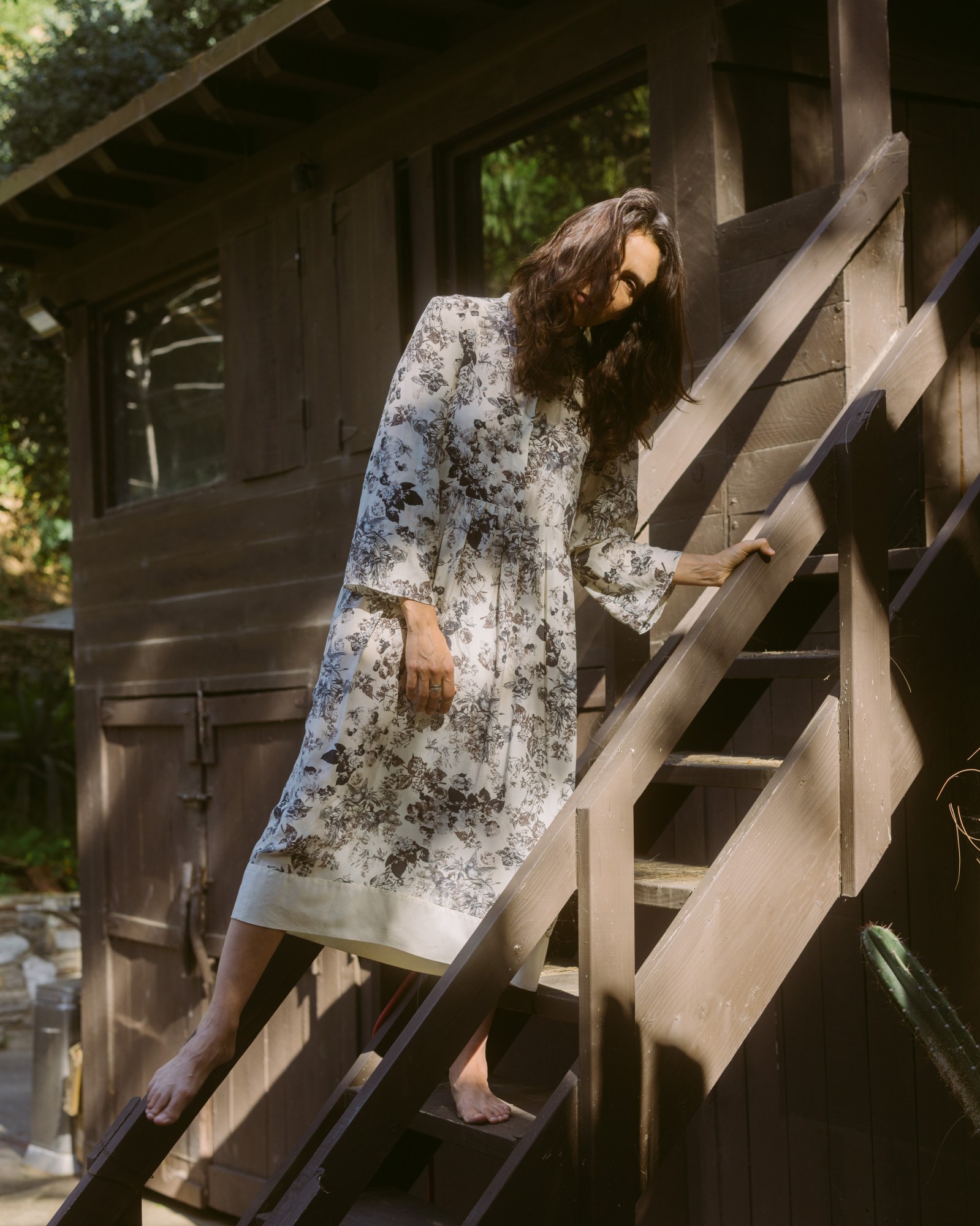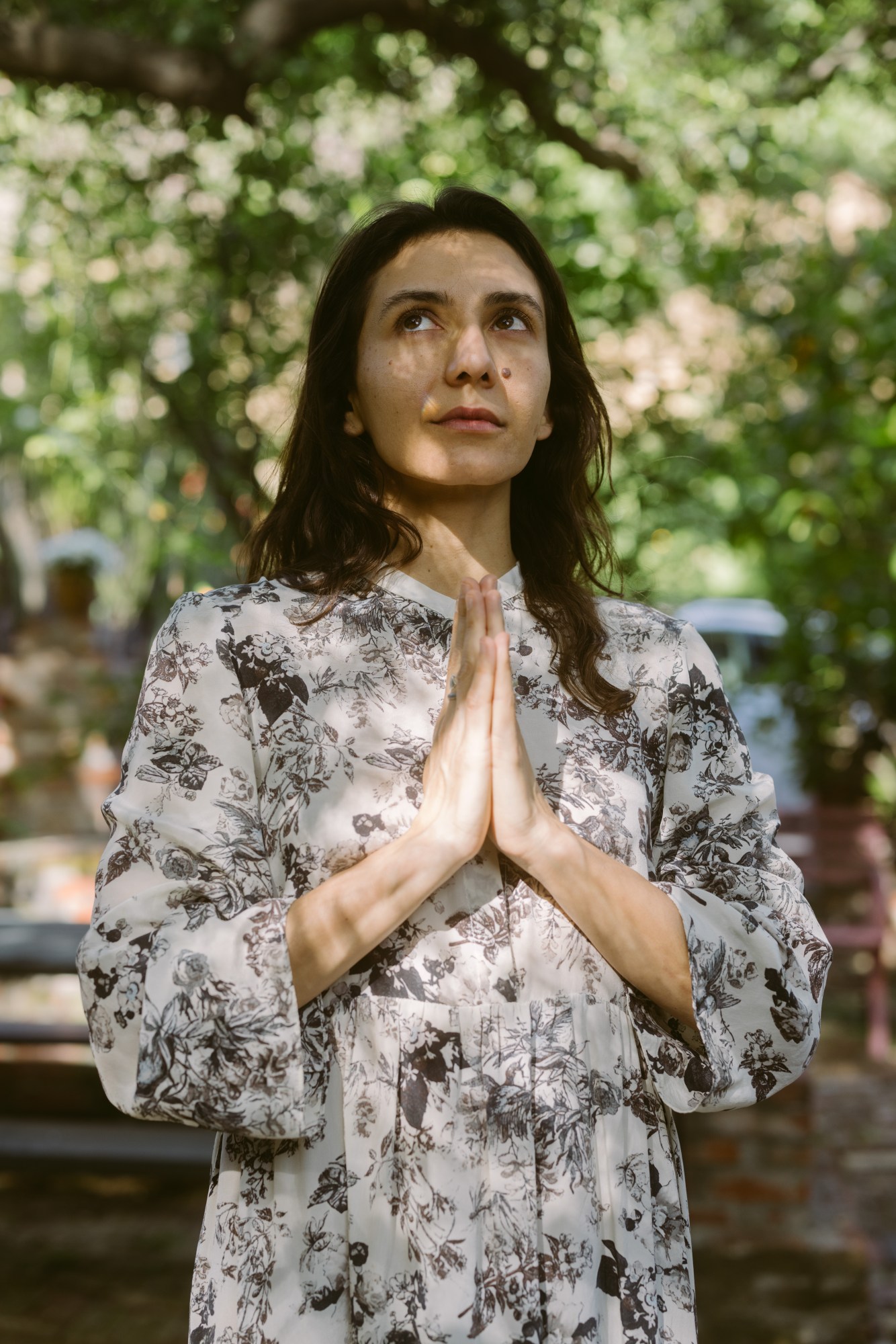Ottessa Moshfegh has seen your TikToks. At the height of the Coronavirus pandemic, the Booker Prize-nominated author’s publisher made her aware of the memeification of her 2018 cult breakout novel My Year of Rest and Relaxation, sending her some examples of the impact it was having on the platform. “I was sorta weirded out by the fact that any of this technology exists and that people are that… weird,” she says with a considered lethargy, a trait carried by artists who have nothing to lose and nothing to prove.
She is in her bedroom in Pasadena, California on a Friday morning, reflecting on how a four-year-old book gained strange prescience in the current moment. It became a guidebook for our collective malaise: an immediate success upon release, My Year of Rest and Relaxation told the story of an unnamed narrator who, fed-up with the dissatisfaction she is feeling toward her current life, uses prescription medications to sleep for a whole year in her New York apartment.
“When Rest and Relaxation came out it had a moment,” she says, “but then, during the pandemic, it seemed like it had a different kind of moment. It became something that people were reaching for as a way to relay what was happening in our lives now.” By the time the pandemic rolled around, readers had slipped into the previous uninhabitable skin of Ottessa’s protagonist. Some, only semi-ironically, thought: ‘God, I wish that could be me.’

“I think that when we reach for stuff like [Rest and Relaxation], when we are suffering, there’s some escapism involved, [but] there’s also a bit of glamourising,” she says, hugging her calf as if to recreate Egon Schiele’s famed Seated Woman… “Because the main character is so irreverent and chic. So, maybe, I’m wondering if the book provided people with a ‘cool’ way of looking at lockdown.”
The chaos of her subjects seems contained only to her books: when she answers our video call, her setting seems sparing. A single candle on a side table behind her flickers against the bare white walls of her bedroom. Her laundry basket looks empty. She’s wearing a bright, loose blouse and baggy bottoms; it’s unclear if she’s still in her pyjamas or if she’s just dressed for the California sun.
Long before Ottessa became the bard of the pandemic, she was a bookish teen like any other. James Baldwin is the first name that comes to mind when she recounts some of her foundational authors; Richard Wright, Ernest Hemingway and D.H. Lawrence follow. After a pause, Kurt Vonnegut and then, Cormac McCarthy. “He was a really major discovery for me,” she says of Cormac, perhaps unsurprisingly, given the two authors’ shared fixation on the dispossessed and desolate.
Eventually, in the early 00s, she found her way to New York, working as an assistant to the legendary publishing figure, Jean Stein. She vividly recalls being in the city on the morning of 11 September: “I watched the people jumping and I’ll never forget it,” she says. “It had a profound effect on me. I could not believe the immediacy of having to make that decision, ‘Do I stay and suffocate or do I jump and take my death into my own hands?’”
There is a certain macabreness to Ottessa’s recollection of the day that feels ripe for analysis: how this event foreshadows the dark and depressing nature of her work; how it seeped into her mind and found itself present on the page.

But it took her a long time before she accepted her place as a novelist. “When I eventually began writing I really identified as a short story writer,” she says. “I really dug my heels in that form. I studied it deeply and practised it religiously.” Her first book, the novella McGlue from 2014, only ended up being a novella because “it just felt like a story that required many pages”.
When Ottessa was writing the stories that would eventually make up her first short story collection, Homesick for Another World, she unintentionally stumbled upon the idea that would become her first full-length novel: Eileen. That book followed the titular young woman who works at a boys’ penitentiary in the 60s, as she falls for an alluring older colleague, Rebecca Saint John. “That was when I woke up to the incredible power of novel writing and how exciting it is,” she says. “I discovered a whole new form. And then…I got really, really into it. My fiction has mostly been novels since then.”
Though her books are all very different beasts, something that connects Eileen, My Year of Rest and Relaxation, 2020’s Death in Her Hands, and her latest, forthcoming book, Lapvona, is Ottessa’s obsession with — and revulsion towards — the human body. A Moshfegian character is usually defined by an aspect of their body or mind that has gone awry. Eileen is a greasy social outcast who pisses in jars; the narrator of Rest and Relaxation has an opioid addiction; many of her short stories focus on people who are fat or thin to the extreme; they have to use colostomy bags or are riddled with acne.
It’s an aspect of her work that has come under fire due to its perceived fatphobia, body shaming, ableism and general offensiveness; Ottessa doesn’t see it that way. “I think I’m fascinated by [the human body],” she says. “I find it to be a crucial element of character, how someone is embodied in their physical self. I want to know: How does a character look? How does a character move? What about this body is distracting them? What are their limitations and habits and how does it reflect on their body? It can be as superficial as how someone wears their hair or as weird as ‘this person is so neurotic they can’t stop eating soap’. I’m interested in where humanity and vanity collide.”
A perfect example of a character that captures the collision of humanity and vanity is Marek, one of the lead characters of Ottessa’s latest, Lapvona. Deformed from birth after his mother’s repeated abortion attempts, Marek is one of the purer souls in the Medieval fiefdom of Lapvona. Unlike Ottessa’s previous novels, which have always focussed on one main character, Lapvona boasts a full cast: a cacophonous company of mystics, idiots, and tyrants. There’s cannibalism, murder, rape and, naturally, shit-eating. Lapvona is a gruesome farce, something like Monty Python and the Holy Grail if it had been directed by David Cronenberg, it displays Ottessa at the height of her abilities and captures the wry humour which she exudes in person but rarely has exhibited in her work.
Lapvona was Ottessa’s first major writing project in quite some time. “I had actually written Death in Her Hands before I had finished My Year of Rest and Relaxation, so it had been years,” she says. “In the meantime, I was working on this slow, long-term novel that I’ve been writing for about four years and which will probably take me another four [more], called The Passenger. I hadn’t planned on writing Lapvona, but then I found myself under lockdown and I was like, ‘God, I need to write a novel for my own sanity.’”
Those who came to Ottessa via My Year of Rest and Relaxation may find themselves somewhat out of their depth in Lapvona, a book that often feels like the diametric opposite of her most famous work. That was always the plan: “I always want to do something that’s completely different,” she says. “And, you know, maybe I took a bigger step in that direction with Lapvona.”

But Lapvona wasn’t the only project Ottessa worked on over the pandemic. In collaboration with her husband, the writer Luke Goebel, she also wrote the screenplay for an upcoming movie adaptation of Eileen. Directed by William Oldroyd (Lady Macbeth) and starring Thomasin McKenzie as Eileen and Anne Hathaway as Rebecca Saint John, she calls the screenplay a “very tonally faithful adaptation” of her novel. Hoping that it will premiere sometime this autumn, Ottessa speaks in nothing but hyperbole about the film: “I think it’s amazing.”
On the topic of adaptations of her work, another equally anticipated one is in the works. Shortly after My Year of Rest and Relaxation’s release, Margot Robbie’s production company LuckyChap acquired the screen rights to it. In early 2020, Greek auteur Yorgos Lanthimos was loosely attached as the film’s director. But since then, there has been radio silence surrounding the project. Ottessa is quite coy about the whole thing.
“What I can say is I have been working on the screenplay,” she reveals. “The way things work in movies is it takes a lot of time, because there are so many moving pieces and so many important roles. You have to factor in other people’s lives, my life, and everything has to come together at the right time. And this has just been something that has been just slowly brewing.” When asked directly if Yorgos is still attached to the project, she replies: “I think… I think that he would prefer I don’t speak about it.”
Ottessa seems distracted at this point, her eyes returning to something unfolding off camera. She stops herself, mid-sentence, to apologise — “I’m sorry, my crazy neighbour just closed my front door and now she’s staring at it.” Her crazy neighbour? “Oh, she’s this neighbour who, I think, has severe mental health issues and has been causing a lot of problems in the community.” The whole event is reminiscent of one of Ottessa’s stories in Homesick for Another World, when a neighbour becomes weirdly obsessed with the new girl who moves next door. The story was written before she moved to Pasadena but the parallels are uncanny.
It seems that to read Ottessa’s stories is to simply pass through a world she already lives in.

Follow i-D on Instagram and TikTok for more on books.
Credits
Photography Michael Tyrone Delaney



